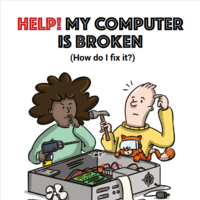Search
Books+
Searching 1,730 books
Search related to the career Electronics Technician
Responsibilities of an Electronics Technician:
1. Troubleshooting and Repair: Electronics technicians are responsible for diagnosing and resolving issues with electronic equipment, systems, and devices. They use various tools and testing equipment to identify and fix problems, ensuring that the equipment is functioning properly.
2. Installation and Maintenance: Electronics technicians install, set up, and configure electronic systems and equipment. They follow technical specifications and guidelines to ensure proper installation and perform routine maintenance to keep the systems in optimal condition.
3. Testing and Calibration: They conduct tests and calibrations on electronic devices and systems to ensure accuracy, reliability, and compliance with industry standards. This may involve adjusting settings, measuring performance, and making necessary adjustments.
4. Documentation and Reporting: Electronics technicians maintain detailed records of equipment repairs, maintenance activities, and test results. They generate reports to document their findings, including any issues encountered, solutions implemented, and recommendations for improvement.
5. Component Replacement: When electronic components or parts malfunction, electronics technicians are responsible for identifying the faulty components and replacing them. They have knowledge of soldering techniques and use specialized tools to perform component-level repairs.
6. Safety Compliance: Electronics technicians adhere to safety protocols and guidelines while working with electronic equipment. They ensure that all electrical connections are secure, circuits are properly grounded, and safety measures are followed to prevent accidents or damage.
7. Upgrading and Modification: As technology advances, electronics technicians may be responsible for upgrading or modifying existing electronic systems to meet new requirements or improve performance. They stay updated with the latest trends and advancements in electronics to effectively carry out these tasks.
8. Collaboration and Communication: Electronics technicians often work as part of a team, collaborating with engineers, supervisors, and other technicians. They communicate effectively to understand project requirements, share information, and provide status updates on ongoing tasks.
9. Customer Support: In some cases, electronics technicians may interact directly with customers to provide technical support, troubleshoot issues, and offer guidance on using electronic equipment effectively and safely.
10. Continuous Learning: Electronics technicians engage in ongoing learning and professional development to stay updated with emerging technologies, industry standards, and best practices. They may attend training programs, workshops, or pursue certifications to enhance their skills and knowledge.
11. Compliance with Regulations: Electronics technicians ensure compliance with relevant regulations, such as electrical codes, safety standards, and environmental regulations. They follow guidelines to ensure that electronic systems and equipment meet legal requirements and industry standards.
12. Quality Control: Electronics technicians perform quality control checks to ensure that electronic equipment and systems meet specified standards. They conduct inspections, perform tests, and verify that all components and connections are functioning correctly.
13. Inventory Management: Electronics technicians may be responsible for managing inventory of electronic components, tools, and equipment. They keep track of stock levels, order necessary supplies, and maintain a well-organized inventory system.
14. Equipment Operation and Training: Electronics technicians operate specialized equipment and machinery required for testing, calibration, or repair. They may also provide training to other team members or end-users on the proper operation and maintenance of electronic systems.
15. Adhering to Ethical Practices: Electronics technicians follow ethical practices and maintain confidentiality when working with sensitive information or proprietary technology. They respect intellectual property rights and handle data and equipment with integrity and professionalism.
Source: Various AI tools
Searched in English.

































